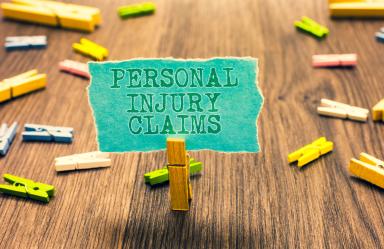Arkansas Personal Injury Laws

Personal injury is an area of the law that concerns cases where an individual becomes injured due to an accident caused by the negligence of other people. Consequently, they suffer some form of monetary and non-monetary loss, which they can subsequently recover from those responsible through a claim or lawsuit. Personal injury can involve a diverse range of matters, from instances of medical malpractice to incidents wherein one incurs an injury due to a defective product.
Given how many people get injured on a daily and annual basis, the state of Arkansas tracks the statistics involved and measures them alongside the effects of established reforms and laws. The state’s Department of Health routinely monitors injuries arising from vehicular accidents and continues to remind residents to follow local laws on seat belt use. The Arkansas Insurance Department produces annual reports on statewide claims as part of its initiative to optimize local rates and protect consumers as they reimburse their losses. Likewise, the Arkansas General Assembly assesses the effects of different statutes, such as Act 796 of 1993, on premiums involving workers’ compensation on a yearly basis.
In order to guide those who seek compensation for their losses in a personal injury case, Arkansas has various laws and guidelines that plaintiffs can refer to on their own or with the help of an attorney. These influence different factors in a case, including the type of damages a victim can recover, the requirements needed to form a lawsuit, and the specific statute of limitations involved in taking legal action. There are also rules on how a victim’s own negligence can affect their compensation and how they can recover damages in cases that involve multiple at-fault parties.
Arkansas Medical Malpractice Law
Medical malpractice occurs when a person undergoing treatment for an ailment or injury ends up suffering harm due to a mistake committed by a doctor or health practitioner. This often results in a worsening or new injury or disability and also leads to death in certain cases. In these scenarios, the victim and their dependents or relatives may take legal action against the offending practitioner or doctor for the resulting damages.
Potential instances of medical malpractice can include:
Surgical, medication, and anesthesia errors.
An improper course of treatment.
Failure to warn a patient of potential risks.
Failure to diagnose an illness or injury.
Failure to obtain a patient’s informed consent regarding a surgery, procedure, or treatment.
To differentiate an actual instance of medical malpractice from an undesirable healthcare outcome, the following factors must be present:
The doctor or practitioner in question met with and treated the victim.
The doctor or practitioner acted with negligence.
The negligence in question caused actual harm to the victim.
In order to establish that actual medical negligence is the cause of a victim’s injury or death, the plaintiff in a malpractice case must prove that the defendant failed to meet the medical standard of care required in their practice during the victim’s treatment. In cases involving the failure to obtain consent, a plaintiff must also have proof that the defendant treated the patient outside of an emergency situation and withheld information customarily given to a patient or by other practitioners prior to administering any treatment. Any proof in these cases is often supported by the testimony of a qualified medical expert whose practice is the same as the defendant’s.
Arkansas Product Liability Law
Product liability involves cases wherein a victim suffers an injury due to a defect in a specific product that they used. In instances like this, a plaintiff must establish that the product involved is defective, which makes it unreasonably hazardous.
In order to prove a manufacturer’s liability, a victim needs to show evidence that the design of the product involved is inherently flawed or that it deviated from an otherwise safe design when it was being manufactured. If applicable, they must also prove that the manufacturer failed to relay relevant information on how to use the product or what kind of hazards it can pose.
However, there are certain types of defenses that can be used by a manufacturer in a product liability case. For instance, they can state that the product involved was not unreasonably dangerous once it was manufactured or sold and that it only became so due to abnormal use, improper maintenance, or an unforeseen alteration. Additionally, they can claim that the victim used the product beyond its anticipated life or that it was still sold by a supplier even after its expiration date, as indicated by a label or tag.
Arkansas Premises Liability Law
Premises liability is an area of personal injury law wherein a person gets injured at an establishment or public space due to the negligence of the property’s owner or other individuals, such as employees. Because owners have a duty of care to ensure that no person is injured on their property, a victim can pursue compensation from them if they fail to uphold that responsibility. However, to figure out how a property owner’s duty of care shall apply in a premises liability case, it must first be determined whether the victim is a licensee, an invitee, or a trespasser.
A licensee is a person who enters the owner’s property with consent and without the intention of providing a benefit or service. The property owner does not owe a duty of care to a licensee until they are made aware of the latter’s presence, after which they must warn them of any hazard on the premises for their safety. In most cases, licensees include visitors or friends who are invited by the owner to a social gathering or event.
Meanwhile, an invitee is a person who enters a property with the goal of giving some form of mutual benefit. Compared to a licensee, a property owner must exercise reasonable care in addressing hazards on the premises to ensure that an invitee is not injured because of them. However, the owner does not owe an invitee a duty of care if the property defects in question are obvious or if the invitee is already aware of them. Invitees can include customers in malls and establishments.
Lastly, a trespasser is a person who enters a property without the owner’s consent. In general, while the owner does not owe a duty of care to a trespasser and is not liable for an injury to the latter, they must still refrain from displaying any willful or wanton misconduct. For example, if a property owner sets up traps with the intention of causing harm to any trespassers, they can be held liable if their act results in a trespasser’s injury.
Joint and Several Liability in Personal Injury Cases in Arkansas
If there are multiple defendants in cases involving personal and medical injury, wrongful death, and property damage, Arkansas law dictates that their liability will be several and not joint. This means each defendant will only pay their share of a victim’s damages in proportion to their assigned fault in the case. This differs from joint and several liability, wherein defendants will be mutually responsible for paying the total damages awarded to a plaintiff, regardless of the division of fault.
In order to compute how much a defendant must pay, the court will multiply the total damages by the percentage of their fault. The result will be the maximum amount of damages that can be recovered from that specific defendant.
Arkansas Is A Modified Comparative Negligence State
While Arkansas does not limit the total economic and non-economic damages that a personal injury plaintiff can recover, it can reduce the total amount of damages awarded under the principle of modified comparative negligence. According to this rule, a plaintiff who is partially liable for the incident that caused their injury will have their total damages deducted based on the percentage of their fault. For example, if a car accident victim is 30% responsible for the crash that occurred, they will have 30% deducted from a damage award worth $200,000, leaving them with only $140,000.
In addition, Arkansas’ modified comparative negligence rule follows a legal threshold of 50%. If a plaintiff’s fault in a case reaches or exceeds this, they will be completely barred from recovering any damages from other parties.
Arkansas Business Liability Insurance Requirements
While it is not explicitly required by the state, obtaining business liability insurance is encouraged for most commercial establishments in Arkansas, including small businesses that have fewer than 500 employees. This type of insurance will help business owners address any financial losses stemming from claims and lawsuits filed against them. In most cases, this occurs if a person suffers an injury within their establishment or due to the negligence of one of their employees.
In general, business liability insurance covers costs related to any injuries or property damage incurred by an individual. It can also pay for losses caused by an injury to a person’s rights through slander, libel, or copyright infringement, along with damages resulting from advertisements. Lastly, it can cover expenses involving legal defense and judgments, though it does not typically address punitive damages brought about by an employee’s willful misconduct.
Business owners can work with insurance providers to determine how much business liability coverage they should purchase. This is often calculated based on how long they have been operating, how many employees they have, and what kind of products or services they offer. An owner’s claim history may also be taken into account. Most are encouraged to have $500,000 to $1 million in business liability insurance, though they are also advised to have higher amounts if they operate a high-risk business or one that often interacts with the public.
How Much Can Someone Sue For an Injury in Arkansas?
Under the Arkansas Constitution, there are no limitations on the compensatory damages that personal injury plaintiffs can recover. This potentially allows victims of accidents and mishaps to be compensated in full for both their economic and non-economic losses. In general, compensatory damages involve medical costs, lost wages, and repair expenses for damaged property. They can also pertain to non-tangible factors stemming directly from injuries, such as emotional distress, mental anguish, the loss of enjoyment of life, and depression.
However, it should be noted that Arkansas law imposes a limit on punitive damages. This type of damages is awarded by the court to punish a defendant found to have purposefully injured a victim or acted with willful or malicious intent that led to harm. Under state law, a personal injury plaintiff’s total punitive damages are limited to $250,000 or three times the amount of their compensatory damages (up to $1 million), whichever is greater.
The Statute of Limitations in Arkansas
According to Arkansas’ statute of limitations for most personal injury cases, plaintiffs have a maximum of three years to take legal action against at-fault parties. This deadline applies to:
Cases that involve bodily injuries.
Cases that involve property damage.
Cases that involve wrongful death (with the statute beginning on the date of the victim’s death).
Meanwhile, those involved in medical malpractice cases have only two years to file a claim or lawsuit. Additionally, if a victim of a defective product is involved in a breach of warranty claim that later results in a product liability claim, they have up to four years to take legal action. If a plaintiff fails to file within any of the given timeframes, the court will likely dismiss any of their future attempts to pursue a claim or lawsuit.
The statute of limitations often begins on the date when the incident that caused injury to a victim took place. However, Arkansas does have certain exceptions regarding when it will begin or continue counting down. For instance, if the individual who is entitled to take legal action is a minor, the statute will only start once they reach the age of 18. After that, they will have up to three years — or until the age of 21 — to file an injury claim or lawsuit.
It should be noted that Arkansas adheres to the discovery rule for personal injury cases. This applies in instances where a victim only discovers an injury or disability caused by an accident at a later time and not on the date when the mishap occurred. As such, the statute will only start on the date when the person has discovered or should have reasonably discovered the injury or disability.
Exceptions and Changes in Medical Malpractice Cases
An exception to Arkansas’ statute of limitations applies in medical malpractice cases where the victim was nine years old or younger when their injury took place. In these cases, the victim or the person representing them will have until the former’s 11th birthday or two years from the malpractice incident to take legal action, whichever is later. However, if the victim’s injury cannot be reasonably discovered within the given time, the victim or their representative will have until the victim’s 19th birthday or up to two years after the injury has been reasonably discovered to file a lawsuit, whichever is earlier.
Lastly, Arkansas’ statute works differently in malpractice cases where a foreign object that becomes stuck inside a victim’s body is not reasonably discovered within the standard two-year deadline. If this happens, a plaintiff can only file a lawsuit within one year from the date when the object was found or should have been reasonably discovered, whichever is earlier.
Legal Resources for Injured Folks in Arkansas
Arkansas Bar Association
The Arkansas Bar Association offers access to a number of legal services and resources through its website. It has a Find A Lawyer section, where personal injury victims with legal concerns can search for an attorney in or near their respective locations based on their practice areas. The website also has a Legal Links section that redirects to various law-related websites and online resources on state guidelines and federal statutes. Lastly, its Discipline Issues section is open to state residents who wish to file a complaint of ethical misconduct against a specific lawyer or judge.
Injury Law Rights - Arkansas
Injury Law Rights is a personal injury organization that provides pro bono assistance to people throughout the country. Its legal team can provide lawyer recommendations and address inquiries from those who are involved in motor vehicle accidents in Arkansas. Its website contains basic information concerning accident statistics in the state, the legal rights of plaintiffs in a personal injury case, and the local statute of limitations for a claim or lawsuit. Additionally, its lawyers are available for a free preliminary consultation regarding the initial queries and concerns of potential plaintiffs. Injury Law Rights can be reached at 855-633-0888 for additional questions and clarifications.
Arkansas Insurance Department - Consumer Assistance
The Arkansas Insurance Department’s Consumer Assistance Section is open to people, including personal injury victims, who have insurance-related concerns. It can help individuals find specific insurance agents and firms through the National Association of Insurance Commissioners’ online search service. It can also redirect consumers to the association’s SERFF Filing Access section, where they can view Rate and Form Filings electronically. The department also accepts online submissions of grievances concerning possible instances of insurance-related fraud through its Consumer Complaint section. Potential complainants can complete and submit the provided form online or through mail, along with any supporting documents, to the department’s Consumer Services Division at 1 Commerce Way, Suite 102 in Little Rock. Reports cannot be submitted online via an iOS or Android tablet or mobile device.
Expertise.com StaffAuthor
Step into the world of Expertise.com, your go-to hub for credible insights. We don't take accuracy lightly around here. Our squad of expert reviewers, each a maestro in their field, has given the green light to every single article you'll find. From rigorous fact-checking to meticulous evaluations of service providers, we've got it all covered. So feel free to dive in and explore. The information you'll uncover has been stamped with the seal of approval by our top-notch experts.




